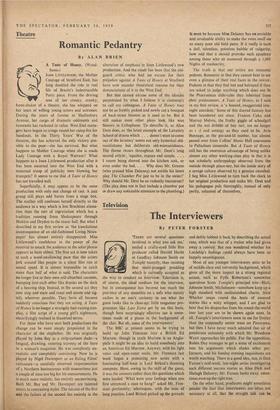Theatre
Romantic Pedantry
By ALAN BRIEN JOAN LITTLEWoon, the Mother Courage of Stratford East, has long doubled the role in real life of Brecht's indestructible Party piece. From the driving seat of her creaky, cranky, bone-shaker of a theatre, she has whipped on her team of willing young actors and actresses. During the years of famine in Shaftesbury Avenue, her cargo of dramatic oddments and remnants has rocketed in value. West End mana- gers have begun to cringe round her camp fire for handouts. In the Thirty Years' War of the theatres, she has achieved the only victory pos- sible to the poor—she has survived. But what happens to Mother Courage when she is made Lady Courage with a Royal Warrant? What happens to a Joan Littlewood production after it has been escorted into the West End with a mounted troop of publicity men blowing, her trumpets? It seems to me that A Taste of Honey has not travelled well.
Superficially, it may appear to be the same production with only one change of cast. A jazz group still plays odd bursts from a stage box. The mother still confesses herself directly to the audience in a way which is less Brechtian aliena- tion than the sort of ingratiation which has a tradition running from Shakespeare through Moliere and Dryden to the music hall. But what I described in my first review as 'the knockabout inconsequence of an old-fashioned Living News- paper' has almost entirely disappeared. Miss Littlewood's confidence in the power of the material to smack the audience in the solar plexus appears to have ebbed. The first act is now taken at such a word-swallowing pace that the actors jerk around like people in a silent film run at sound speed. It is almost impossible to catch more than half of what is said. The characters no longer live in their own self-absorbed cocoons, bumping into each other like drunks on the deck of a heaving ship. Instead, in the second act they now stop and stare and react and emote and sig- nify wherever possible. They have all become suddenly conscious that they are acting. A Taste of Honey is no longer a strangely hair-raising non- play, a film script of a young girl's nightmare, electrifyingly realised in theatrical terms.
For those who have seen both productions the change can be most simply pinpointed in the character of the stepfather. He was originally played by John Bay as a strip-cartoon dude—a languid, drawling, sneering travesty of the hero in a woman's magazine. He was completely un- realistic and completely convincing. Now he is played by Nigel Davenport as an Ealing Films' caricature—a carefully observed impersonation of a Northern businessman with mannerisms just a couple of sizes too big for his measurements. He is much more realistic, but entirely unconvincing. Both Mr. Bay and Mr. Davenport are talented actors in contrasting styles. The success of the first Ana tne taiture of tne seconu nes eaure.ty 111 LUC alteration of emphasis in Joan Littlewood's new production. And the result has been that the old- guard critics who had no excuse for their prejudice against .A Taste of Honey at Stratford have now sounder theoretical reasons for their denunciations of it in the West End.
But this cannot excuse some of the idiocies perpetrated by what I believe it is customary to call my colleagues. A Taste of Honey may not be as freshly picked and newly cut a bouquet of back-street blooms as it used to be. But it still makes most other plays look like wax flowers in. Cellophane. To describe it, as Alan Dent does, as 'the latest example of the Lavatory School of drama which . . . doesn't want to come out of the lavatory' seems not only hysterical old- maidishness but deliberate old-womanishness. The theme recurs throughout Mr. Dent's long second article : 'squalor, impure and simple. . . . I resent being shoved into the kitchen sink, or even under the bed. . . . Why does Mr. Greene (who praised Miss Delaney) not entitle his latest play The Chamber Pot just to be in the swim?' Why should Mr. Dent be so violently inaccurate? (The play does not in fact include a chamber pot or draw any noticeable attention to the plumbing.) It must be because Miss Delaney has an enviab and invaluable ability to make the veins swell so many poor old bald pates. If it really is sue a dull, talentless, pointless babble of vulgarit how odd that it should provoke such apople, among those who sit unmoved through a 1,0( Nights of mediocrity.
The truth is that our critics are romant pedants. Romantic in that they cannot bear to SI even a glimpse of their real faces in the mirro Pedants in that they feel lost and betrayed if the are asked to judge anything which does not I the Procrustean slide-rules they inherited fro their predecessors. A Taste of Honey, as I sai in my first review, is 'a boozed, exaggerated lab night anecdote.' Some of this slurred fantasy hi been laundered out since. Frances Cuka an Murray Melvin, the frothy giggle of schoolgi and the wet dribble of boy tart, are no longs as r 11 and unstagy as they used to be. Av Bunnage, as the gin-and-Id mother, has almo passed over from Collins' Music Hall coarsene to Palladium innuendo. But A Taste of Hone still has the enormous advantage of being unlit ,almost any other working-class play in that it not scholarly anthropology observed from tt outside through pince-nez, but the inside story I a savage culture observed by a genuine canniba I beg Miss Littlewood to turn back the clock I her original production and make Mr. Dent ar his pedagogue pals thoroughly, instead of on partly, ashamed of themselves.


































 Previous page
Previous page